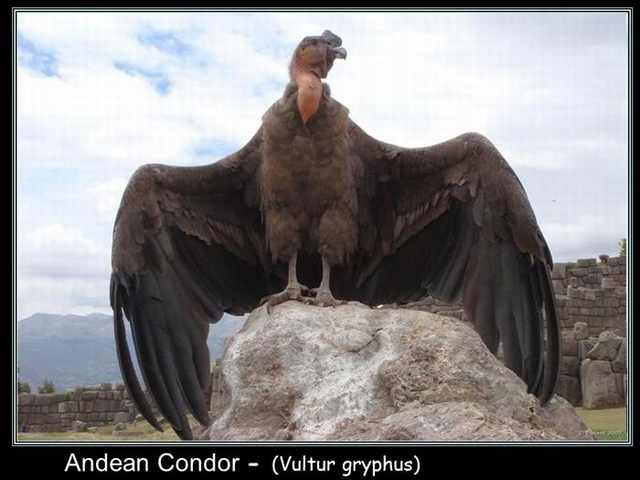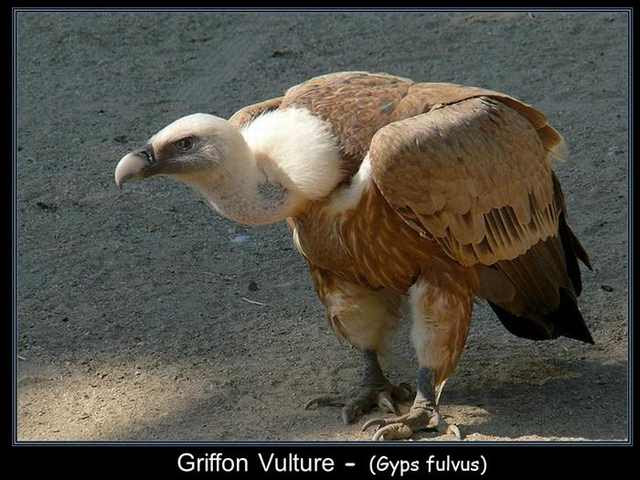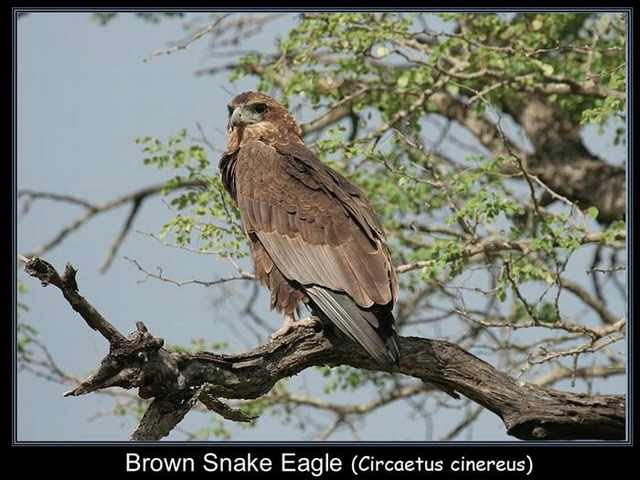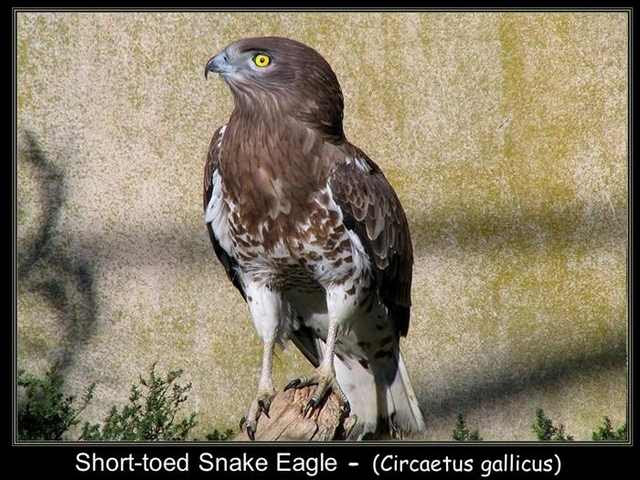We're used to thinking of the birds we see everyday - small, bread-crumb-stealing little birdies that fly about in droves or chirp at us from the top of the trees. But some birds are larger, meaner and stronger than the ones we see flying about. These are the birds of prey - the large, predatory animals with wings that dominate the skies and are the scourge of both flying and land-bound animals, that fear that long shadow looming above them.
Many of us know the bald eagle, the condor and the hawk, but now we're going to take a bigger look at this royal family of predatory birds, in all its sizes, shapes and colors!

Condor is the name for two species of vultures, each in a monotypic genus. They are the largest flying land birds in the Western Hemisphere. The Andean Condor, which inhabits the Andean mountains and the California Condor currently restricted to western coastal mountains of the United States and Mexico.

The king vulture is a large bird found in Central and South America. It is a member of the New World vulture family Cathartidae. This vulture lives predominantly in tropical lowland forests stretching from southern Mexico to northern Argentina.

The California condor is a New World vulture, the largest North American land bird. This condor became extinct in the wild in 1987 (all remaining wild individuals were captured), but the species has been reintroduced to several location in the United States.

The Andean condor is a South American bird in the New World vulture family Cathartidae and is the only member of the genus Vulture.

The Cape griffon or Cape vulture, also known as Kolbe's vulture, is an Old World vulture in the family Accipitridae, which also includes eagles, kites, buzzards and hawks.

The griffon vulture (Gyps fulvus) is a large Old World vulture in the bird of prey family Accipitridae. Like other vultures, it is a scavenger, feeding mostly from carcasses of dead animals which it finds by soaring over open areas, often moving in flocks.

The bearded vulture, also known as the lammergeier or lammergeyer, is the only member of the genus Gypaetus. It eats mainly carrion and lives and breeds on crags in high mountains in southern Europe, the Caucasus, Africa, the Indian subcontinent, and Tibet, laying one or two eggs in mid-winter that hatch at the beginning of spring. Populations are resident.

The Egyptian vulture, also called the white scavenger vulture or pharaoh's chicken, is a small Old World vulture and the only member of the genus Neophron.

It is the most widely distributed species of eagle. Like all eagles, it belongs to the family Accipitridae. These birds are dark brown, with lighter golden-brown plumage on their napes. Immature eagles of this species typically have white on the tail and often have white markings on the wings. Golden eagles use their agility and speed combined with powerful feet and massive, sharp talons to snatch up a variety of prey (mainly hares, rabbits, marmots and other ground squirrels).

The eastern imperial eagle is a large species of bird of prey that breeds from southeastern Europe to western and central Asia. Most populations are migratory and winter in northeastern Africa, and southern and eastern Asia.

Verreaux's eagle is a large African bird of prey. It is also called the black eagle, especially in Southern Africa, leading to potential confusion with the Indian black eagle, which lives in Asia.

The Wahlberg's eagle is a bird of prey. It is about 53–61 cm in length with a wingspan of 130–146 cm and a body mass of 437–845 g for males and 670–1400 g for females on average. Like all eagles, it belongs to the family Accipitridae.

The white-tailed eagle — also called the sea eagle, erne, and white-tailed sea-eagle — is a large bird of prey in the family Accipitridae which includes other raptors such as hawks, kites, and harriers


The African fish eagle or – to distinguish it from the true fish eagles, the African sea eagle – is a large species of eagle that is found throughout sub-Saharan Africa wherever large bodies of open water occur that have an abundant food supply.

The bald eagle is a bird of prey found in North America. A sea eagle, it has two known sub-species and forms a species pair with the white-tailed eagle.

The bald eagle is a bird of prey found in North America. A sea eagle, it has two known sub-species and forms a species pair with the white-tailed eagle (Haliaeetus albicilla). Its range includes most of Canada and Alaska, all of the contiguous United States, and northern Mexico. It is found near large bodies of open water with an abundant food supply and old-growth trees for nesting.

The bald eagle is an opportunistic feeder which subsists mainly on fish, which it swoops down and snatches from the water with its talons. It builds the largest nest of any North American bird and the largest tree nests ever recorded for any animal species, up to 4 m (13 ft) deep, 2.5 m (8.2 ft) wide, and 1 metric ton (1.1 short tons) in weight.

The harpy eagle is a Neotropical species of eagle. It is sometimes known as the American harpy eagle to distinguish it from the Papuan eagle which is sometimes known as the New Guinea harpy eagle or Papuan harpy eagle.

The red kite is a medium-large bird of prey in the family Accipitridae, which also includes many other diurnal raptors such as eagles, buzzards, and harriers.

The black kite is a medium-sized bird of prey in the family Accipitridae, which also includes many other diurnal raptors

The brahminy kite also known as the red-backed sea-eagle in Australia, is a medium-sized bird of prey in the family Accipitridae, which also includes many other diurnal raptors such as eagles, buzzards and harriers.

The black-winged kite is a small diurnal bird of prey in the family Accipitridae best known for its habit of hovering over open grasslands in the manner of the much smaller kestrels.

The swallow-tailed kite is an elanid kite which breeds from the southeastern United States to eastern Peru and northern Argentina. Most North and Central American breeders winter in South America where the species is resident year round.

The rough-legged buzzard, also called the rough-legged hawk is a medium-large bird of prey. It is found in Arctic and Subarctic regions of North America and Eurasia during the breeding season and migrates south for the winter.

The red-shouldered hawk is a medium-sized hawk. Its breeding range spans eastern North America and along the coast of California and northern to northeastern-central Mexico.


The red-tailed hawk is a bird of prey, one of three species colloquially known in the United States as the "chickenhawk," though it rarely preys on standard sized chickens.

The osprey, sometimes known as the sea hawk, fish eagle, river hawk or fish hawk, is a diurnal, fish-eating bird of prey. It is a large raptor, reaching more than 60 cm in length and 180 cm across the wings.


The crested serpent eagle is a medium-sized bird of prey that is found in forested habitats across tropical As

The brown snake eagle is a species of bird of prey in the Accipitridae family. found in Southern and Eastern Africa, in countries such as Sudan, South Africa, Mauritania and Senegal.

The short-toed snake eagle also known as short-toed eagle, is a medium-sized bird of prey in the family Accipitridae which also includes many other diurnal raptors such as kites, buzzards and harriers.


The bateleur is a medium-sized eagle in the family Accipitridae. Its closest relatives are the snake eagles. It is the only member of the genus Terathopius and may be the origin of the "Zimbabwe Bird", national emblem of Zimbabwe.


The secretarybird or secretary bird is a very large, mostly terrestrial bird of prey. Endemic to Africa, it is usually found in the open grasslands and savannah of the sub-Saharan region.

The Eurasian sparrowhawk (Accipiter nisus), also known as the northern sparrowhawk or simply the sparrowhawk, is a small bird of prey in the family Accipitridae. Adult male Eurasian sparrowhawks have bluish grey upperparts and orange-barred underparts; females and juveniles are brown above with brown barring below. The female is up to 25% larger than the male – one of the largest differences between the sexes in any bird species.

Cooper's hawk is a medium-sized hawk native to the North American continent and found from Southern Canada to Northern Mexico. As in many birds of prey, the male is smaller than the female.

The African goshawk is a species of bird of prey in the Accipitridae family. As defined here following the Handbook of the Birds of the World, it is found in Angola, Botswana, Burundi and Central Africa.

The pale chanting goshawk is a bird of prey in the family Accipitridae. This hawk breeds in southern Africa. It is a resident species of dry, open semi-desert with 75 cm or less annual rainfall.

The northern goshawk, Accipiter gentilis, is a medium-large bird of prey in the family Accipitridae, which also includes other diurnal raptors, such as eagles, buzzards and harriers.

The common kestrel is a bird of prey species belonging to the kestrel group of the falcon family Falconidae. It is also known as the European kestrel, Eurasian kestrel, or Old World kestrel.

The American kestrel, sometimes colloquially known as the sparrow hawk, is a small falcon, and the only kestrel found in the Americas. It is the most common falcon in North America, and is found in a wide variety of habitats.

. A falcon is any one of 37 species of raptor in the genus Falco,widely distributed on all continents of the world.
Adult falcons have thin tapered wings, which enable them to fly at high speed and to change direction rapidly. Fledgling falcons, in their first year of flying, have longer flight feathers, which makes their configuration more like that of a general-purpose bird such as a broadwing. This makes it easier to fly while learning the exceptional skills required to be effective hunters as adults.


The peregrine falcon, also known as the peregrine, and historically as the duck hawk in North America, is a widespread bird of prey in the family Falconidae.

The saker falcon is a very large falcon. This species breeds from eastern Europe eastwards across Asia to Manchuria.

The northern crested caracara, also called the northern caracara and crested caracara, is a bird of prey in the family Falconidae.

The striated caracara, is a bird of prey of the Falconidae family. In the Falkland Islands it is known as the Johnny rook.

The mountain caracara is a species of bird of prey in the Falconidae family. It is found in puna and páramo in the Andes, ranging from southern Ecuador, through Peru and Bolivia, to northern Argentina and Chile.